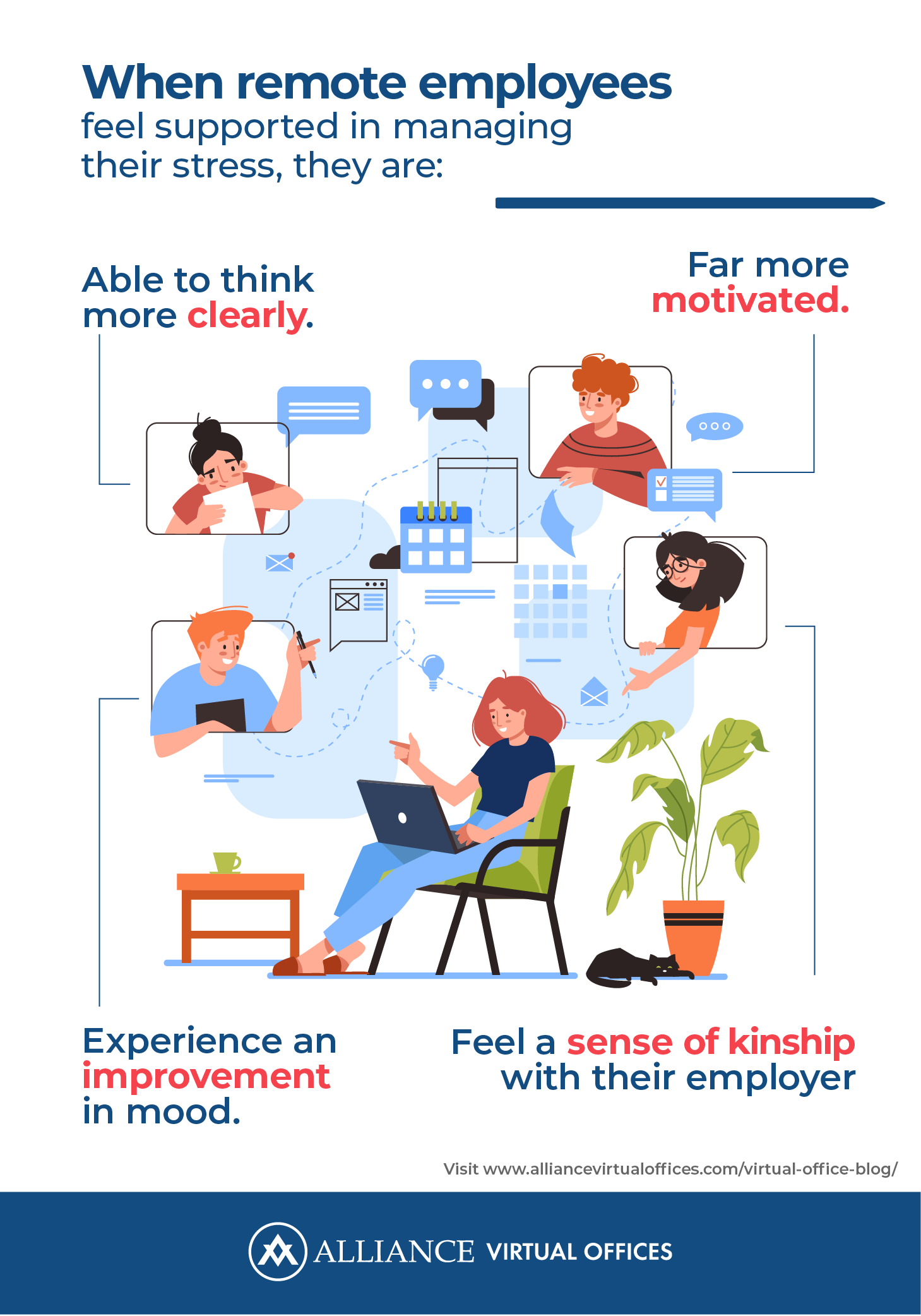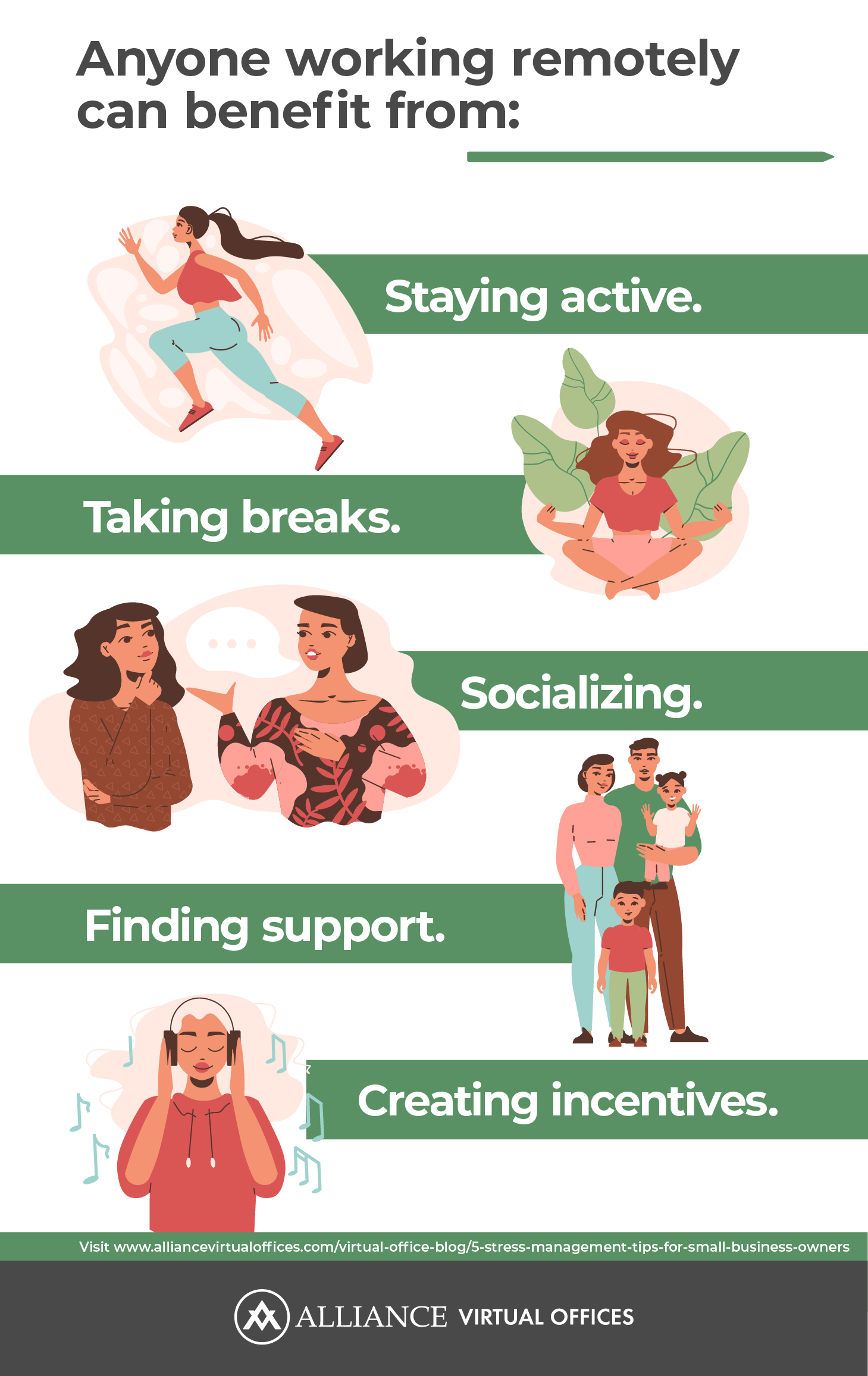- Have you noticed WFH stress is unique from traditional office stress?
- How can remote workers improve stress management?
- What are the long-term benefits of reducing stress and implementing self-care?
Q: How can remote workers manage their stress?
A: Remote workers can better manage stress by emphasizing work-life balance. They can accomplish this by setting dedicated work hours and disengaging with work when they’re off the clock.
Running a business is a lot of work.
It’s easy to get overwhelmed by stress, and when the line between your personal life and work begins to blur, burnout becomes a serious threat.
39 million workers resigned in the first 10-months of 2021, and many quit due to burnout.
Beyond being generally unpleasant, burnout can result in decreased productivity and mental alertness. This means your business could suffer from your excessive dedication to working.
Workers who experience burnout are 63 percent more likely to call out sick. This highlights both the physical and mental impact burnout can have on productivity.
Luckily, there’s a solution: stress management and self-care.
Practicing self-care for stress can boost your mood and get you back to performing at your best.
Here’s what you need to know about stress and how to implement stress management into your life.
- What workplace stressors are there when you work from home?
- How can remote business owners combat these stressors?
- What are the long-term benefits of effective stress management?
- Conclusion
Workplace Stress from the Home Office
Working from home may seem like the ultimate stress-free endeavor, but in reality, remote workers face a number of unique stressors.
There are three major categories of stressors facing the at-home worker today:
- Social dynamics
- Physical workspaces
- Routine
Each of these factors contributes to burnout in its own way. When combined, they can make work far more difficult and less enjoyable, resulting in lowered productivity and less subjective well-being.
Isolation
This is one of the biggest challenges of working from home.
While it’s great to be in an environment without distraction so you can focus on your business, working all alone can also have a negative impact on your mental health.
In isolation, it’s easy to feel like your work isn’t particularly impactful. You lack direct feedback about your performance and likely aren’t seeing the way your business makes a difference.
This feeling is compounded by the fact that isolation itself negatively impacts mental health. Even the most introverted people need some socialization.
When you work from home, especially if you work long hours, it can quickly become a very lonely experience and lead to demotivation.
This loneliness can change an enthusiastic, passionate business owner into one who feels their work is empty, burdensome, and lacks value.
Eye Strain and Inactivity
The physical elements of remote work can be surprisingly stressful on the body.
Remote work almost always involves extended periods of time staring at a screen. While that may not sound physically taxing, screen time can be seriously demanding on the eyes.
When remote business owners spend day after day watching a screen for hours, they can experience eye strain. This makes the workday far less pleasant and can seriously impact a worker’s ability to focus.
Additionally, working remotely involves a lot of sitting. Running your business from home means you may be moving less than ever.
Prolonged inactivity leads to:
- Heart disease
- Muscle aches
- High blood pressure
- Sluggishness
- Depression
- Anxiety
Even just a few of these factors can impact your mental stress, so incorporating physical activity into the workday is critical to a healthy workforce.
Lack of Stress Management Routines
While the ability to create your own schedule adds quite a bit of freedom, remote business owners don’t always manage that freedom well.
A lack of structure, particularly around self-care practices, is a major factor contributing to stress for those operating remotely.
If your team includes remote employees, it’s important that you encourage them to take time for self-care as many remote workers feel pushed to be endlessly productive
When this happens, remote workers often feel pressured to constantly work as hard as possible. In the majority of cases, this leads directly to burnout.
The problem can be even worse for remote small business owners. With no one to answer to, self-employed remote workers and small business owners may get so caught up in their work that they forget to take lunch breaks or schedule time for fun activities.
When the work-life balance gets thrown off, stress builds at a rapid rate.
The result?
A brief period of hyper-productivity leads to morale plummeting and work becoming incredibly difficult.
How Can Remote Business Owners Improve Stress Management?
With the negative impact of stress readily apparent, it should be obvious why prioritizing stress management is so important for the remote worker.
There are a variety of simple but effective ways to combat work stress. When implemented, these tips can boost worker morale and increase their long-term success on the job.
1. Stay Active
One of the biggest things remote business owners can do to boost burnout prevention is to move their bodies.
Getting up and moving has a lot of physical benefits. It keeps you fit, healthy, and prevents the tightness and achiness that comes with prolonged sitting.
Moving around also increases blood flow, increasing focus and mental clarity.
The best way to incorporate movement into the workday depends on a mix of scheduling and individual preference.
Some remote business owners may prefer to take short walks every hour or two. Others may take a long walk or hit a workout during their lunch break.
Regardless of which you do, prioritizing movement in whatever way feels best for you will have long-term benefits in stress reduction.
2. Take Breaks
While it’s easy for you to get up and grind away all day when working remotely, this is counterproductive in the long run. Taking breaks is important for a variety of reasons.
We’ve all experienced the fog that comes with hammering away at a task uninterrupted for too long.
However, by incorporating short, regular breaks, workers can bring fresh thoughts to their work without feeling like their stress is boiling over.
Longer breaks can help combat burnout as well. Having regular downtime at the end of the day, taking lunch breaks, and using vacation days are all important parts of maintaining a reasonable work-life balance.
Make sure you and your employees are taking short breaks throughout the day alongside longer breaks in the week, month, and year.
3. Socialize
Remote work’s biggest pitfall is its isolating nature.
Humans need social interaction to boost their mood, maintain morale, and experience the meaningful contributions of their work.
When working exclusively from home, these things can easily fade away.
As such, it’s important that remotely operating small business owners schedule time to socialize both at work and outside of work.
Ensure that you and any employees have regular check-ins. Focus on both instructions and feedback, but also make time to celebrate each person’s contributions to the business.
Also, be sure to schedule time with friends and family outside of work. Socializing in different contexts helps build a well-rounded sense of well-being that will bring you back to your work fresh and excited.
4. Support Employees and Yourself
Mental health problems like stress and burnout can be insidious. They creep up in silence and can overtake a worker without them even knowing it.
That’s why it’s so important to create support structures, both for your workers and for yourself.
Having resources for work and general mental health support can prevent workers from falling deeper into burnout.
That’s why regular check-ins are necessary as it allows you to dedicate time to support yourself and your employees. Ask what is needed and provide it.
This will help everyone with managing their stress, as well as keep productivity levels and subjective well-being high.
5. Create Incentives
When remote workers operate largely in isolation, they often disconnect from the meaningfulness of their work. Creating incentives can go a long way to combat this problem.
Incentives help your employees by acting as a kind of feedback for their work. When there are goal-based rewards, workers feel their work is worth something.
Achieving incentives also help boost morale. Workers who reach a certain milestone can take pride in their achievements being recognized.
Finally, incentives can help workers through periods of low motivation. When they lose sight of the intrinsic meaning of their work, workers can look to the incentive as a reason to keep going.
While it’s great to offer big incentives like bonuses, even small rewards can have a significant impact on stress management. Don’t underestimate small symbolic things like employee of the month titles.
Use incentives with yourself as well. Planning little celebrations along the way can keep you motivated to grow your business and keep your spirits high.
Long-Term Benefits of Stress Management
It’s obvious that stress reduction has the immediate benefit of increasing your sense of calm and happiness.
Beyond that though, there are a number of ways better stress management impacts your business long-term.
Hard Work and Commitment
When remote employees feel supported in managing their stress, they are:
- Far more motivated
- Experience an improvement in mood
- Able to think more clearly
- Feel a sense of kinship with their employer
All this leads to a commitment to working hard and staying with the company. Over time, this allows employees to master the skills needed to excel at their roles, leading to better outputs and overall business growth.
Committed workers also see an increase in creative thinking. As they become more comfortable, workers are able to bring creative thinking to their work, leading to new ideas and better outcomes.
The same is true of small business owners. Feeling like you can manage your stress makes you more likely to stick with what you’re doing over time, a critical component of long-term success.
Better Workflow
When those working remotely don’t feel overly stressed, they are able to better communicate and interact.
The result is that there is more transparency in the overall workflow of projects. Your employees stay more informed about how things are going, allowing for better planning and more support.
Over time, this leads to greatly enhanced levels of productivity, as fewer things fall through the cracks.
Stronger Teams
Stressed people aren’t known for their peppy moods. When those working remotely get stressed, they tend to have a harder time bonding with their coworkers.
By incorporating stress management into your daily life, you’re better positioned to connect with your team. This leads to an increased synergy among team members, more opportunities to socialize, and gives them the chance to achieve better outcomes with higher efficiency.
Less Turnover
Burnout isn’t sustainable. When your remote employees feel constantly stressed, it’s inevitable that they’ll eventually search for a different job.
Managing worker stress in your small business will help your employees feel their work is viable in the long term.
This will keep your employees engaged, allow you to retain your top talent, and ensure you aren’t continuously investing in hiring processes and posting job openings.
Key Takeaways on Stress Management
While some cities are better for mental health than others, stress management for remote small business owners and their employees always requires a bit of planning. Workers of all levels need to feel supported and make time for self-care.
Anyone working remotely can benefit from:
- Staying active
- Taking breaks
- Socializing
- Finding support
- Creating incentives
Prioritizing self-care in this manner has long-term benefits for the individual, the team, and the organization as a whole.
If you’re looking to escape the isolation of working from home while maintaining your flexibility, Alliance Virtual Offices’ coworking communities are the perfect solution. They provide a collaborative atmosphere for both you and your team so you can stay productive while working remotely.












